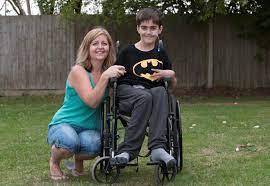| General Non-Fiction posted March 24, 2022 |
      |
Our story ...
Fostering ability
by Wendy G

We were to complete our family by adding a nine-year-old boy with multiple and severe disabilities, to join our other three.
Jonathan required full-time care for every aspect of daily life. He had limited movement of his left arm and hand – that was it.
There was just one problem, which made me uncertain about fostering till he was eighteen – or even till he was ten.
I was afraid for my sanity!
Being non-verbal, unable to communicate in any way, must have been incredibly frustrating. Was this why, as soon as he was put to bed each night, it began? Loud, wild, crazy laughing – non-stop, for hours! Nothing – soft music, stories, quiet talk, stroking – would quieten him.
I was exhausted. Finally, after three months, I lost it.
I yelled at him.
"I can't do this anymore. I am going crazy! Eight times a night I am getting up to you! Either you learn to sleep … or you can pack your bags and go! Straight out the front door!"
Such a shrill torrent of screeching nonsense from me. A sign of what sleep deprivation can do. What an insane thing to say. Impossible for him to pack his bags and go! My children gazed at me in horror – as if I was a wicked witch.
"Mum! You would never put one of US out! You can't put Jonathan out - he's our brother!"
I groaned, and wept. In retrospect, I believe Jonathan understood. That seemed to mark a turning point. He did not want to be sent away.
But I had made up my mind; he would learn to sleep, and he would learn to communicate! I felt that this maniacal uncontrollable laughing stemmed from frustration.
I took Jonathan to a different epilepsy specialist, and a trial drug worked brilliantly. He became almost seizure free, more alert through the day – and tired at bedtime. I devised an unusual bedtime strategy, and it worked … eventually. I made him lie on his tummy! It is hard to laugh like a maniac in that position.
Very gradually he started to settle. By the end of a year I only needed to turn him twice as needed, indicated by just a low moan. I coped with that easily.
My sanity returned.
Concurrently I taught him to shake his head for "No!" and smile for "Yes". Basic communication was established.
Jonathan became a much-loved part of the family. He was helped to "play" the piano with his left hand, "dance" in his wheelchair, caress the cats, enjoy the hammock, go on walks and picnics, wheelchair races … he joined in all our life and family experiences. If the others were upset, he listened, comforted, but never told their secrets. He couldn't.
Jonathan appreciated nature - he would raise his face sky-ward and feel the fresh air, breeze, sunshine … his smile of pure pleasure was delightful.
He would "feel" music: jig in his wheelchair if it was lively, raise his face and smile for beautiful classical music, uplifted in heart, or weep silently, tears flowing gently down his cheeks for moving or sad music. Composers would have been gratified at his appreciation and understanding.
Lessons for us.
Life became rich and full.
What did we learn from fostering?
Hard lessons about life, ourselves and others.
A difficult initiation into the world of fostering, dealing with the many associated government departments, an even worse one into the world of disability – and the experience of prejudice, disdain, and discrimination. We lost friends and even some family members who did not understand, finding such extreme disability very confronting.
We learned to never judge by outward appearance. Some of the most wonderful people, involved in Jonathan's life and ours, were tough and tattooed, with multiple piercings and bizarre hair styles, long before these were fashionable. They treated Jonathan as an equal and valued human being.
Fostering taught us the importance of perseverance and compassion, what it means to love another without ever hearing in return, "I love you too."
We learned to appreciate life itself, and simple pleasures – and be thankful.
Adoption contest entry
We were to complete our family by adding a nine-year-old boy with multiple and severe disabilities, to join our other three.
Jonathan required full-time care for every aspect of daily life. He had limited movement of his left arm and hand – that was it.
There was just one problem, which made me uncertain about fostering till he was eighteen – or even till he was ten.
I was afraid for my sanity!
Being non-verbal, unable to communicate in any way, must have been incredibly frustrating. Was this why, as soon as he was put to bed each night, it began? Loud, wild, crazy laughing – non-stop, for hours! Nothing – soft music, stories, quiet talk, stroking – would quieten him.
I was exhausted. Finally, after three months, I lost it.
I yelled at him.
"I can't do this anymore. I am going crazy! Eight times a night I am getting up to you! Either you learn to sleep … or you can pack your bags and go! Straight out the front door!"
Such a shrill torrent of screeching nonsense from me. A sign of what sleep deprivation can do. What an insane thing to say. Impossible for him to pack his bags and go! My children gazed at me in horror – as if I was a wicked witch.
"Mum! You would never put one of US out! You can't put Jonathan out - he's our brother!"
I groaned, and wept. In retrospect, I believe Jonathan understood. That seemed to mark a turning point. He did not want to be sent away.
But I had made up my mind; he would learn to sleep, and he would learn to communicate! I felt that this maniacal uncontrollable laughing stemmed from frustration.
I took Jonathan to a different epilepsy specialist, and a trial drug worked brilliantly. He became almost seizure free, more alert through the day – and tired at bedtime. I devised an unusual bedtime strategy, and it worked … eventually. I made him lie on his tummy! It is hard to laugh like a maniac in that position.
Very gradually he started to settle. By the end of a year I only needed to turn him twice as needed, indicated by just a low moan. I coped with that easily.
My sanity returned.
Concurrently I taught him to shake his head for "No!" and smile for "Yes". Basic communication was established.
Jonathan became a much-loved part of the family. He was helped to "play" the piano with his left hand, "dance" in his wheelchair, caress the cats, enjoy the hammock, go on walks and picnics, wheelchair races … he joined in all our life and family experiences. If the others were upset, he listened, comforted, but never told their secrets. He couldn't.
Jonathan appreciated nature - he would raise his face sky-ward and feel the fresh air, breeze, sunshine … his smile of pure pleasure was delightful.
He would "feel" music: jig in his wheelchair if it was lively, raise his face and smile for beautiful classical music, uplifted in heart, or weep silently, tears flowing gently down his cheeks for moving or sad music. Composers would have been gratified at his appreciation and understanding.
Lessons for us.
Life became rich and full.
What did we learn from fostering?
Hard lessons about life, ourselves and others.
A difficult initiation into the world of fostering, dealing with the many associated government departments, an even worse one into the world of disability – and the experience of prejudice, disdain, and discrimination. We lost friends and even some family members who did not understand, finding such extreme disability very confronting.
We learned to never judge by outward appearance. Some of the most wonderful people, involved in Jonathan's life and ours, were tough and tattooed, with multiple piercings and bizarre hair styles, long before these were fashionable. They treated Jonathan as an equal and valued human being.
Fostering taught us the importance of perseverance and compassion, what it means to love another without ever hearing in return, "I love you too."
We learned to appreciate life itself, and simple pleasures – and be thankful.
 Recognized |
Jonathan is not his real name (changed for privacy). Everything else is non-fiction.
For us, the story of fostering is inextricably entwined with that of the world of the disabled.
Although he was not expected to reach adulthood, Jonathan will be forty in July (despite some close calls with death), and lives a happy and fulfilled life in a Group Home not far from us. I am his advocate and his Legal Guardian.
Note: I wrote this story from scratch, although I have written a different one about him previously. Some readers may recognise some similarities.
(690 words)
Pays
one point
and 2 member cents. For us, the story of fostering is inextricably entwined with that of the world of the disabled.
Although he was not expected to reach adulthood, Jonathan will be forty in July (despite some close calls with death), and lives a happy and fulfilled life in a Group Home not far from us. I am his advocate and his Legal Guardian.
Note: I wrote this story from scratch, although I have written a different one about him previously. Some readers may recognise some similarities.
(690 words)

You need to login or register to write reviews. It's quick! We only ask four questions to new members.
© Copyright 2024. Wendy G All rights reserved.
Wendy G has granted FanStory.com, its affiliates and its syndicates non-exclusive rights to display this work.


